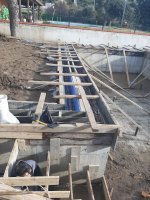Ok. Although I have learned about pool chemistry and maintaining my pool thanks to this site, I am totally new to closing a pool. The problem I am having is the articles on this site are tailored towards pools in US. Around here most of us have concrete overflow pools with separate overflow tanks (the water first overflows into a smaller basin and then sucked to filter), fully tiled, no skimmers, and return jets are at the bottom (hence lowering the water level below the return jets have no meaning for us). Winters are quite mild and no freezing occurs. In order to translate the given advice I would like to understand the objectives behind closing a pool.
Before the winter many people here drain the pool to half and let the algae grow and the frogs sing. Beginning of summer pool is fully drained and cleaned with acid and then refilled with clean water. Why is the practice like this? Pool is drained to half to protect a concrete pool from seismic shocks and avoid overflow from rain. Then it is fully drained and cleaned with acid. Tiles are very resistant to acid. At most you get grout damage which you can fix every 5 years or so. Many people prefer to swim in a freshly filled water rather than water from the previous season. Some people remove the pumps some don’t. I know it is probably not eco friendly but it is how things are done.
If I would like to do a better job than this, and I assume that’s how TFP guys would do, what are my objectives if I don’t expect winter freeze?
One option is to keep the pool running in winter. My pump is not a variable speed pump but I have a timer built in. Do I simply cover the top of the pool? Note that it is not very easy to cover an overflow pool as water needs to overflow from sides. Do I keep the SWG on? How long do I run the pump per day? I can also circulate the water from the deep end drain if I want to disable the overflow tank (just mentioning as an option).
But do I really want this? Water is cheap and electricity is expensive around here and getting the pool cleaned beginning of summer is cheaper than running the pool over the winter even if I add the costs of the salt and cyanuric acid.
Or is my objective to be eco friendly? If not why should I keep the water in the pool during winter and make sure it doesn’t grow algae? Or is it because draining the pool is a problem? I can easily drain my pool because I already have drain piping which enables me to empty the pool to a place where it is ok by local rules and regulations.
Basically what are my objectives for winter and what am I trying to achieve?
Thanks
Before the winter many people here drain the pool to half and let the algae grow and the frogs sing. Beginning of summer pool is fully drained and cleaned with acid and then refilled with clean water. Why is the practice like this? Pool is drained to half to protect a concrete pool from seismic shocks and avoid overflow from rain. Then it is fully drained and cleaned with acid. Tiles are very resistant to acid. At most you get grout damage which you can fix every 5 years or so. Many people prefer to swim in a freshly filled water rather than water from the previous season. Some people remove the pumps some don’t. I know it is probably not eco friendly but it is how things are done.
If I would like to do a better job than this, and I assume that’s how TFP guys would do, what are my objectives if I don’t expect winter freeze?
One option is to keep the pool running in winter. My pump is not a variable speed pump but I have a timer built in. Do I simply cover the top of the pool? Note that it is not very easy to cover an overflow pool as water needs to overflow from sides. Do I keep the SWG on? How long do I run the pump per day? I can also circulate the water from the deep end drain if I want to disable the overflow tank (just mentioning as an option).
But do I really want this? Water is cheap and electricity is expensive around here and getting the pool cleaned beginning of summer is cheaper than running the pool over the winter even if I add the costs of the salt and cyanuric acid.
Or is my objective to be eco friendly? If not why should I keep the water in the pool during winter and make sure it doesn’t grow algae? Or is it because draining the pool is a problem? I can easily drain my pool because I already have drain piping which enables me to empty the pool to a place where it is ok by local rules and regulations.
Basically what are my objectives for winter and what am I trying to achieve?
Thanks


